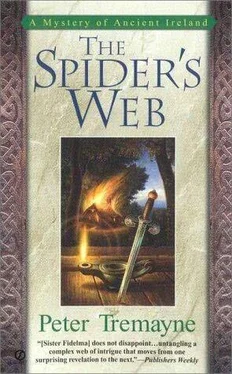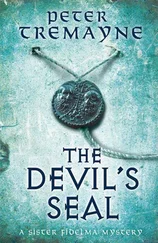Peter Tremayne - The Spider's Web
Здесь есть возможность читать онлайн «Peter Tremayne - The Spider's Web» весь текст электронной книги совершенно бесплатно (целиком полную версию без сокращений). В некоторых случаях можно слушать аудио, скачать через торрент в формате fb2 и присутствует краткое содержание. Жанр: Исторический детектив, на английском языке. Описание произведения, (предисловие) а так же отзывы посетителей доступны на портале библиотеки ЛибКат.
- Название:The Spider's Web
- Автор:
- Жанр:
- Год:неизвестен
- ISBN:нет данных
- Рейтинг книги:5 / 5. Голосов: 1
-
Избранное:Добавить в избранное
- Отзывы:
-
Ваша оценка:
- 100
- 1
- 2
- 3
- 4
- 5
The Spider's Web: краткое содержание, описание и аннотация
Предлагаем к чтению аннотацию, описание, краткое содержание или предисловие (зависит от того, что написал сам автор книги «The Spider's Web»). Если вы не нашли необходимую информацию о книге — напишите в комментариях, мы постараемся отыскать её.
The Spider's Web — читать онлайн бесплатно полную книгу (весь текст) целиком
Ниже представлен текст книги, разбитый по страницам. Система сохранения места последней прочитанной страницы, позволяет с удобством читать онлайн бесплатно книгу «The Spider's Web», без необходимости каждый раз заново искать на чём Вы остановились. Поставьте закладку, и сможете в любой момент перейти на страницу, на которой закончили чтение.
Интервал:
Закладка:
Crón interrupted, her voice full of distaste.
‘So are you saying that we must accept Móen as the son of my father … his own uncle? That he is my … my half-brother?’
She shivered as she said it.
‘Tomnát died and left a living child,’ confirmed Fidelma. ‘Teafa, as we all know, pretended that he was a foundling, discovered while she was hunting in the forest. At first it was not suspected that the child was unlike other children. But then Teafa realised that things were wrong with the child. She sent for Gadra and Gadra, being a wise man and healer, realised the problem. He could not heal the afflictions caused by the incest but he taught Teafa a means of communicating with Móen. Apart from the physical problems, the child was highly intelligent and able to learn. Teafa raised a talented boy.’
‘Are you saying that Eber did not even know that Móen was his own son?’ asked Agdae.
‘By all accounts he was kind to the boy,’ Fidelma replied. ‘Of all the people here, all who hated Eber, only Móen did not.’
She turned once again to Gadra.
‘Ask Móen whether he knew that Eber was his father.’
Gadra shook his head.
‘No need for that. He has suffered much. I will tell you, however,that Teafa never told the boy. It was for his own protection. Nor was Eber told that Móen was his flesh and blood, so far as I know.’
‘In fact, Eber was eventually told,’ Fidelma said quickly. ‘There was a row one day which was witnessed by the youth Crítán. We will come to that later.’
‘Why is my father’s … sexual life,’ interrupted Crón, pausing a moment and then reforming her thoughts. ‘While this may be of interest, it does not tell us who is responsible for Eber and Teafa’s death.’
‘Oh, but it does.’
‘Please explain then,’ invited the tanist coldly. ‘Are you saying that you now believe Móen to be guilty? That he found out who his real father was? That he hated him for the wrong which Eber had done to his mother and himself?’
Fidelma shook her head.
‘I dismissed the charge that Móen was the killer at an early stage of this investigation. Even before I had spoken with him, I knew Móen was not the killer.’
‘Perhaps you will explain why?’ Father Gormán asked dryly. ‘It seemed perfectly clear to me.’
‘The original accusation was that Móen had killed Teafa and then made his way to Eber’s apartments and killed him. There were certain things wrong with this idea. Firstly, from the haughty young Crítán I learnt that he had seen Teafa alive after Móen went to Eber’s apartments. To be responsible for both murders, Móen would have had to kill Teafa first and then Eber.’
‘Why couldn’t he have done that?’ demanded Agdae.
‘Because Menma claimed that he had found Móen bending over the body of Eber, knife in hand, having just killed him. The whole essence of the charge is that Móen was caught almost in the act.’
They greeted the point in silence. Then Crón said: ‘But Menma has already been condemned by you as a murderer and therefore a liar. Perhaps he lied.’
‘He told lies right enough,’ agreed Fidelma impassively. ‘But not in this instance. His discovery of Móen at the scene of this crime was a gift. It could not have worked out better. But Teafa was still alive when Móen entered Eber’s apartments. Crítán, returning from Clídna’s establishment, saw Móen on his way to Eber’s apartments and then saw Teafa still alive standing by her cabin with a lamp. For a moment, when he was telling me this story, I think Crítán recognised the illogic of it. But he wanted Móen to be guilty, so he ignored it.
‘Móen had been for a walk in the early hours of the morning and was just entering the cabin of Teafa when someone handed him an Ogam stick. Ogam is the method by which one communicates with Móen. Móen told me that someone with calloused hands, but whom he had thought, by the rich perfume he detected, was a female, had pressed the Ogam stick into his hand. It told him to go to Eber’s apartments at once. He did so and, having stumbled over the body, it was there that Menma found him. The person who pressed the Ogam stick into Móen’s hands was the killer who meant him to be discovered and condemned.’
‘What proof have you of the existence of this fabled stick, instructing Móen to go to Eber?’ asked Father Gormán.
‘Proof? I have the stick itself.’ Fidelma smiled complacently. ‘You see, Móen thought he dropped the stick at the door. It was knocked from his hand before he set off to Eber’s. The killer did not want the evidence found. They had already killed Eber. Just as the killer was going to recover the stick, Teafa, who had been awakened by the encounter, came out. She was holding a lamp and had discovered Móen was missing. She saw the Ogam stick and picked it up. At this point she was seen by Crítán. She asked Crítán if he had seen Móen. The boy lied and went on his way. The killer, who had to wait in the shadows until Crítán moved on, was faced with a dilemma. Teafa had gone back into her cabin to read the faked Ogam message. So now she had to be killed. The oil lamp which Crítán had seen in Teafa’s hand was knocked tothe ground in the struggle and caught fire. That had to be extinguished because the killer wanted to ensure that Móen could also be accused of the murder. The Ogam stick with the instructions on it was thrown into the fire but not entirely burnt. There is still enough on it to compare with Móen’s excellent memory. He recalled that the stick said: “Eber wants you now.” The letters ER and WANTS remained.’
Brother Eadulf was smiling at the simplicity of Fidelma’s reconstruction.
‘Móen did another impossible thing,’ he offered. ‘When Menma found Móen leaning over the body, he said it was just before sunrise. And the lamp was lit by Eber’s bedside.’
‘Well? What is wrong with that?’ asked Dubán. ‘It would be dark before sunrise.’
Eadulf chuckled.
‘Why would Móen need to light a lamp? This disposes of the accusation that Móen entered by stealth and stabbed Eber to death as he lay there asleep.’
‘Exactly,’ agreed Fidelma approvingly. ‘Unless we are to believe that a blind person had need to light a lamp to see what they were doing.’
‘Eber could have lit the lamp himself,’ Agdae pointed out. ‘He could have lit the lamp to let Móen in and …’
‘Of course!’ Fidelma was sarcastic. ‘Eber was awake, lit the lamp and let Móen in. He then obligingly went back to bed and waited while Móen felt his way to where he kept his hunting knives, selected one, found his way to the bed and stabbed him to death. The easier answer is Móen’s version of what happened. That when he entered the room he found Eber already dead. The killer had already struck. The killer then went to divert Móen to Eber’s apartments and then found that they had to deal with Teafa. Eber was not slain in his sleep. He was killed by someone he knew very well; someone he had no suspicion about. He had lit the lamp and allowed that person into his bed chamber.’
‘Who would Eber trust enough to allow into his bed chamber?’ demanded Agdae. ‘His wife?’
Crón let out a gasp.
‘Are you accusing my mother?’
Fidelma looked at Cranat thoughtfully. The widow of Eber was sitting disdainfully watching her.
‘I was waiting for you to reach me with your foul allegations,’ Cranat said sibilantly. ‘Sister Fidelma, I remind you that I am a princess of the Déisi. I have powerful friends.’
‘Your rank and friends mean nothing to me, Cranat. The law applies to us all in equal measure. But we have finally come to the spider in the centre of its complicated web.’
Crón was staring aghast at her mother.
Читать дальшеИнтервал:
Закладка:
Похожие книги на «The Spider's Web»
Представляем Вашему вниманию похожие книги на «The Spider's Web» списком для выбора. Мы отобрали схожую по названию и смыслу литературу в надежде предоставить читателям больше вариантов отыскать новые, интересные, ещё непрочитанные произведения.
Обсуждение, отзывы о книге «The Spider's Web» и просто собственные мнения читателей. Оставьте ваши комментарии, напишите, что Вы думаете о произведении, его смысле или главных героях. Укажите что конкретно понравилось, а что нет, и почему Вы так считаете.











